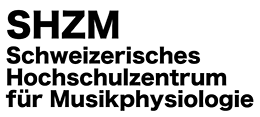Workshops
| Bettina Bläsing: Improvising (with) Rhythm and Movement |
| Technical University Dortmund |
|
We can hardly escape a musical beat - whether we like it or not, we easily groove along. The ability and predisposition to tune into a rhythm and adapt our movement to it is an important basis for joint action, successful communication and social bonding. In this workshop we explore connections between rhythm, coordination and communication with methods from dance and movement improvisation, in loose connection with current research topics.
|
| Nina Düvel: Studying the Groove Experience with Empirical Research |
| Hanover Music Lab, Hanover University of Music, Drama, and Media, Germany |
|
Music is often described as “being very groovy” or “not grooving at all” – but how can the term “groove" actually be defined, and how can this phenomenon be studied? Since the early 2000's, researchers have tackled this question, conducting multiple studies. An overview of the current state of research is provided, workshop participants will have a chance to reenact some studies and discuss the topics presented.
|
| Holger Geschwindner1 & Christian Benning2: Basketball is Jazz – The Rhythm of the Game |
| 1Institute of Applied Nonsense and 2Christian Benning, University of Music and Performing Arts Munich |
|
This workshop/ demonstration presents an interdisciplinary project which combines music and sport in an unprecedented manner, taking basketball practice to another level. Benning will present his own invention: an innovative sport/music “hybrid” system, that gives a musical score to the game of basketball. Geschwindner will show how this method can be used to improve the technical efficiency and accuracy of players. End result? Percussion is integrated into basketball training in a way that makes the rhythm of the game accessible to the player. This multi-media presentation includes a live demonstration by professional ball players.
|
| Toni Gruber: Clapping – Stepping – Sticking – Body Percussion |
| University of Music Vienna, Austria/ Bavarian Theater Academy August Everding, Munich, Germany |
|
In this body-music-workshop, we will combine stomp rhythms with hand-to-hand drum patterns, using prepared installation pipes. This method is suitable for physical body training and elementary polyrhythmic experiences with groups.
|
| Clare Guss-West: Restoring Rhythm – The Foundation of Mental Health |
| Dance & Creative Wellness Foundation, Zurich, Switzerland |
|
The ‘Dance for health’ sector addresses today’s insidious epidemic of mental health challenges, prioritizing rhythmic music that intensifies the mental health benefits of dance. Clare explores the evidence-based, use of Rhythm to target specific neurological disorders.
|
| Horst Hildebrandt: Stress Reduction Through Rhythmisation and Self-Hypnosis in the Musical Profession |
| Zurich University of the Arts and Basel Music University, Switzerland |
|
The workshop provides assistance for stress reduction and rhythmisation of work processes for musicians. On the one hand, examples of break structure, differential learning and mental or semi-mental training will be presented. On the other hand, possibilities of muscle and fascia care, regenerating breathing exercises and resource-activating exercises from various self-hypnosis techniques are presented.
|
| Raluca Matei: On the Bea(s)t: Questioning the Classical Music Ideology |
| Postdoctoral Researcher and Director of Learning for the Professional Doctorate in Occupational Health Psychology, at Birkbeck, University of London, UK |
|
Is there any way in which we could interfere with the drumroll of the Western classical music ideology, in order to restore musicians’ creative flow and wellbeing, and empower them to think critically? In the conversational atmosphere of this workshop, I propose that we listen so some musical examples, brainstorm some ideas together, and explore new epistemic rhythms that may depart from the socially desirable discourse in classical music.
|
| Roland Pongratz1 and Monika Ketterl2: Zwiefache – Living Intangible Cultural Heritage |
| 1 Bayerischer Landesverein für Heimatpflege e. V. 2 University of Music and Performing Arts Munich |
|
Since 2016, the dance Zwiefache has been considered part of our “Intangible Cultural Heritage.” After its induction to the list for Bavaria, it was added in the same year to the nationwide directory. During this workshop, participants will get an interesting insights into the history of this dance of changing rhythms. Then they will have a chance to try it out to live music and find out for themselves what if feels like to dance the Zwiefache!
|
| Rafael Reina: Applying Karnatic Rhythmical Techniques to Western Music |
| Conservatory of Amsterdam, The Netherlands |
|
This workshop addresses the issues of how rhythm could be taught differently in the West, and how this new methodology could impact the performance of rhythmically complex contemporary music. This method can also be seen as the starting point of a new creative approach for improvisers and composers.The three main goals are to a) describe South Indian (Karnatic) rhythmical concepts which could be considered sufficiently universal to be integrated with western classical and jazz aesthetics, to b) show how these techniques can be utilized to analyze and perform western contemporary music with more understanding and accuracy, and to c) demonstrate how these concepts can be integrated within a western creative framework, be it improvised or composed.
|
| Klaus Rom: Rhythm in Training Methods – Why We Should Sometimes Walk in Old Shoes |
| Sport Sciences, Karl-Franzens University of Graz, Austria |
|
Why do experienced runners never throw old shoes away until they are completely worn down, even though they have new ones? Why do we sometimes read about a “complete new” trend in training and rehearsal that we practiced decades ago – and presumed to be complete out of date and unsuitable? Why do young men wear beards again, and after a decade of “eat less fat, live longer,” carbohydrates seem to make us sick? What are the underlying mechanisms of these phenomena, and what can we learn from them in order to find our own way to rehearse and train better?
|
| Wolfram Winkel: Playing Prime Number Units |
| University of Musik and Performing Arts Munich, Germany |
|
Prime number units are used in asymmetrical time signatures, such as in a 7/8 bar, or as a subdivision of the pulse, like seventuplets. This workshop will offer some new ideas about how to deal with complex rhythmic structures – for both beginners and advanced musicians.
|
| Kathryn Woodard: Syncopation, Cross-rhythm, and Aksak Meter: A Workshop in Pedagogical Approaches at the Piano |
| Sonic Crossroads, Istanbul, Turkey |
|
Complex rhythms such as syncopation, cross-rhythms and irregular meter are not usually introduced to younger students at the piano. Instead, they are taught at later stages of learning, after a student has obtained some proficiency at the instrument. By tackling these rhythms at an earlier stage, a teacher opens up an entirely different realm of music to young students, keeping them engaged and motivated to learn. In this workshop, connections will be drawn between rhythms of different styles in order to provide pedagogical tips.
|


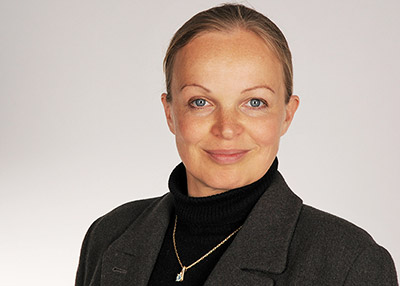
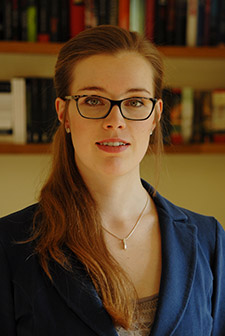 Nina Düvel studied music and mathematics to become a teacher in secondary education at Hanover University of Music, Drama and Media (HMTMH) and Leibniz University Hannover, and received a masters in systematic musicology at the HMTMH. After finishing her studies in 2018, she has spent some months at Goldsmiths, University of London as an intern working on music psychology research with the Music, Mind & Brain Group. Since the beginning of 2019, she is a research fellow and doctorate student at the HMTMH with Prof. Dr. Reinhard Kopiez.
Nina Düvel studied music and mathematics to become a teacher in secondary education at Hanover University of Music, Drama and Media (HMTMH) and Leibniz University Hannover, and received a masters in systematic musicology at the HMTMH. After finishing her studies in 2018, she has spent some months at Goldsmiths, University of London as an intern working on music psychology research with the Music, Mind & Brain Group. Since the beginning of 2019, she is a research fellow and doctorate student at the HMTMH with Prof. Dr. Reinhard Kopiez.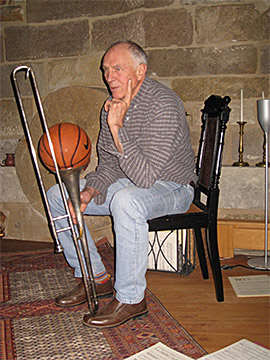 Holger Geschwindner was born in 1945 and started playing first division basketball when he was a teenager. He has won several championships and captained the German basketball team at the 1972 Olympics. During his playing days, he studied mathematics and physics, read philosophy and literature, and travelled the world. He worked for the Max-Planck-Institute of Psychiatry, built mill wheels in Bamberg, raised a pig named Bruno, saved a pecan nut farm in Mississippi, and hunted wolves around Mount Ararat. Geschwindner has been working with Dirk Nowitzki since 1995. He heads the "Institute for Applied Nonsense" where he still tries to reconcile sports with music and mathematics, physics, philosophy, and psychology.
Holger Geschwindner was born in 1945 and started playing first division basketball when he was a teenager. He has won several championships and captained the German basketball team at the 1972 Olympics. During his playing days, he studied mathematics and physics, read philosophy and literature, and travelled the world. He worked for the Max-Planck-Institute of Psychiatry, built mill wheels in Bamberg, raised a pig named Bruno, saved a pecan nut farm in Mississippi, and hunted wolves around Mount Ararat. Geschwindner has been working with Dirk Nowitzki since 1995. He heads the "Institute for Applied Nonsense" where he still tries to reconcile sports with music and mathematics, physics, philosophy, and psychology.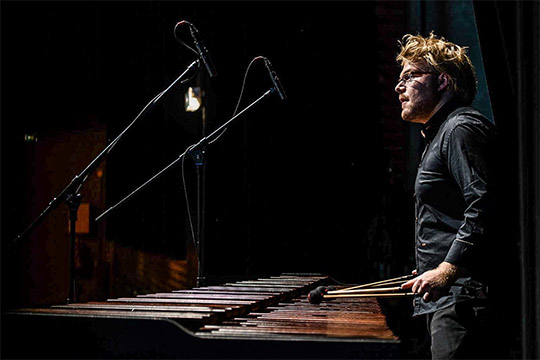 Christian Felix Benning (*1995), multi-percussionist, is from Dachau, Germany. He took his first drum lessons at the age of three and immediately decided to become a percussionist. At 13, he was enrolled as Germany’s youngest precollege student for percussion at the University of Music and Performing Arts in Munich, studying with Dr. Peter Sadlo, Adel Shalaby and Arnold Riedhammer, winning several international competitions with highest scores, and absolving his Bachelor of Music with special distinction in 2019. Beyond his classic musical work and his leading role in a formative cultural project in Mauritius, since 2018 he has been collaborating with Dirk Nowitzki’s mentor Holger Geschwindner in a long-term interdisciplinary project combining percussion with basketball. Benning performances all over the world include concerts at the Elbphilharmonie (Hamburg, Germany), Musikverein (Graz, Austria), Beethoven-Haus (Bonn, Germany) Hercules Hall and Brunnenhof (Munich, Germany) or Century Park (Shanghai, China). He is the recipient of a grant from the German Scholarship Foundation.
Christian Felix Benning (*1995), multi-percussionist, is from Dachau, Germany. He took his first drum lessons at the age of three and immediately decided to become a percussionist. At 13, he was enrolled as Germany’s youngest precollege student for percussion at the University of Music and Performing Arts in Munich, studying with Dr. Peter Sadlo, Adel Shalaby and Arnold Riedhammer, winning several international competitions with highest scores, and absolving his Bachelor of Music with special distinction in 2019. Beyond his classic musical work and his leading role in a formative cultural project in Mauritius, since 2018 he has been collaborating with Dirk Nowitzki’s mentor Holger Geschwindner in a long-term interdisciplinary project combining percussion with basketball. Benning performances all over the world include concerts at the Elbphilharmonie (Hamburg, Germany), Musikverein (Graz, Austria), Beethoven-Haus (Bonn, Germany) Hercules Hall and Brunnenhof (Munich, Germany) or Century Park (Shanghai, China). He is the recipient of a grant from the German Scholarship Foundation.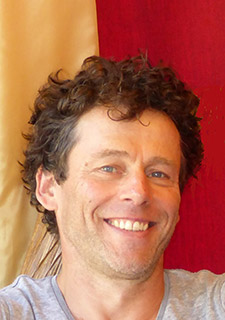 Toni Gruber studied Rhythmics at the University of Music and Performing Arts in Vienna, as well as African Dance with Bob Curtis and Mamadou Fall. Shortly afterwards he got a lectureship in Rhythmics for movement analysis and body education at the University of Vienna. He was instrumental in the founding of the „Bavarian Theatre Academy August Everding Munich“ when he moved to Munich. There he teaches musical and drama students and coaches opera singers in extensive methods of performing movement: body-language-role-finding, rhythm, psychophysical body training, stage fighting as well as African-Latin dance. Toni developed a “stick, stomp & body percussion training.” He invented the ZYKLOKINETIKON – a psychophysical improvisation model for body theater, which is used internationally to train movement actors.
Toni Gruber studied Rhythmics at the University of Music and Performing Arts in Vienna, as well as African Dance with Bob Curtis and Mamadou Fall. Shortly afterwards he got a lectureship in Rhythmics for movement analysis and body education at the University of Vienna. He was instrumental in the founding of the „Bavarian Theatre Academy August Everding Munich“ when he moved to Munich. There he teaches musical and drama students and coaches opera singers in extensive methods of performing movement: body-language-role-finding, rhythm, psychophysical body training, stage fighting as well as African-Latin dance. Toni developed a “stick, stomp & body percussion training.” He invented the ZYKLOKINETIKON – a psychophysical improvisation model for body theater, which is used internationally to train movement actors.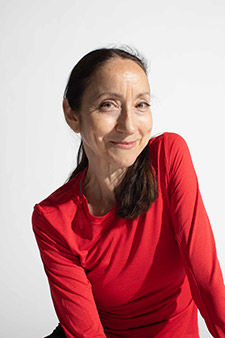 Former professional dancer, choreographer, opera director, holistic health practitioner and author, Clare’s specialist work translates Attentional Focus research findings for direct dance practice. Findings are adapted as complementary tools for dancers, teachers and healthcare practitioners enhancing physical and mental performance. Clare teaches this work for such companies as Finnish National Ballet, Houston Ballet, The Royal Ballet and lectures on Senior Dance Practice, MAS Dance Science programme, Bern University and for the Royal Academy of Dance. Director of the ‘Dance & Creative Wellness’ Foundation, Clare leads an international benchmarking initiative for the sector and lobbies for the validation of dance in innovative preventative healthcare.
Former professional dancer, choreographer, opera director, holistic health practitioner and author, Clare’s specialist work translates Attentional Focus research findings for direct dance practice. Findings are adapted as complementary tools for dancers, teachers and healthcare practitioners enhancing physical and mental performance. Clare teaches this work for such companies as Finnish National Ballet, Houston Ballet, The Royal Ballet and lectures on Senior Dance Practice, MAS Dance Science programme, Bern University and for the Royal Academy of Dance. Director of the ‘Dance & Creative Wellness’ Foundation, Clare leads an international benchmarking initiative for the sector and lobbies for the validation of dance in innovative preventative healthcare.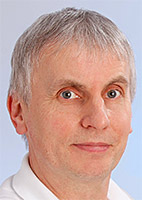
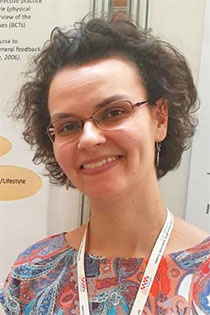 Raluca has a PhD in Music Psychology, with a focus on musicians’ health. She is currently a Postdoctoral Researcher and currently acts as Programme Director of Learning for the unique UK-based Professional Doctorate in Occupational Health, Psychology, and Management, at Birkbeck, University of London, UK. She was also trained as a classical violinist. In 2018, Raluca received funding from the Institute of Musical Research and the Royal Musical Association, to organise a set of interdisciplinary workshops on critical thinking in musicians’ health education, which brought together 50 experts who brainstormed ideas.
Raluca has a PhD in Music Psychology, with a focus on musicians’ health. She is currently a Postdoctoral Researcher and currently acts as Programme Director of Learning for the unique UK-based Professional Doctorate in Occupational Health, Psychology, and Management, at Birkbeck, University of London, UK. She was also trained as a classical violinist. In 2018, Raluca received funding from the Institute of Musical Research and the Royal Musical Association, to organise a set of interdisciplinary workshops on critical thinking in musicians’ health education, which brought together 50 experts who brainstormed ideas.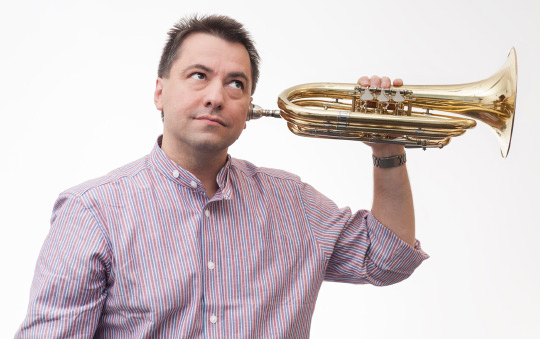 Roland Pongratz M.A. (*1971) stammt aus Regen im Bayerischen Wald (Niederbayern). Der studierte Volkskundler und Musikpädagoge betreibt "Kultur&Konzept - Büro für Kulturwissenschaft und -management". Zu Kernbereichen seines Wirkens gehört die Volksmusikpflege, so ist er u. a. Gründer und Projektleiter von "drumherum - Das Volksmusikspektakel" (größtes und wichtigstes Festival für traditionelle Volksmusik in Bayern) in Regen, Musikalischer Leiter der "Volksmusikakademie in Bayern" in Freyung, Redaktionsleiter des volksmusikalischen Fachmagazins »zwiefach«, Mitglied in der Arbeitsgemeinschaft der hauptamtlichen Volksmusikpfleger und -forscher Bayerns, Juror bei den bedeutendsten Volksmusikwettbewerben in Bayern und Österreich sowie Museumsleiter und Ausstellungsmacher. Obendrein ist er nicht nur vielgefragter Dozent und Referent, sondern auch als Musikant in unterschiedlichen Formationen aktiv. (Foto: Christoph Hellhake)
Roland Pongratz M.A. (*1971) stammt aus Regen im Bayerischen Wald (Niederbayern). Der studierte Volkskundler und Musikpädagoge betreibt "Kultur&Konzept - Büro für Kulturwissenschaft und -management". Zu Kernbereichen seines Wirkens gehört die Volksmusikpflege, so ist er u. a. Gründer und Projektleiter von "drumherum - Das Volksmusikspektakel" (größtes und wichtigstes Festival für traditionelle Volksmusik in Bayern) in Regen, Musikalischer Leiter der "Volksmusikakademie in Bayern" in Freyung, Redaktionsleiter des volksmusikalischen Fachmagazins »zwiefach«, Mitglied in der Arbeitsgemeinschaft der hauptamtlichen Volksmusikpfleger und -forscher Bayerns, Juror bei den bedeutendsten Volksmusikwettbewerben in Bayern und Österreich sowie Museumsleiter und Ausstellungsmacher. Obendrein ist er nicht nur vielgefragter Dozent und Referent, sondern auch als Musikant in unterschiedlichen Formationen aktiv. (Foto: Christoph Hellhake)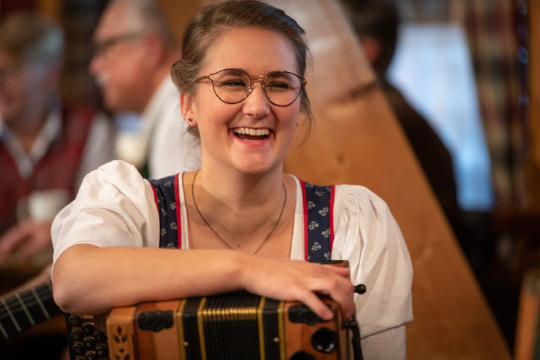 Monika Ketterl B.A. (*1995) aus der Nähe von Ingolstadt studiert aktuell im Master IGP Steirische Harmonika an der Hochschule für Musik und Theater München. Nach dem bereits absolvierten Bachelorstudium Volksmusik ist sie tätig als Instrumentalpädagogin und sehr engagiert in der Pflege von Brauchtum, Volksmusik und Volkstanz. (Foto: Sabine Rieß)
Monika Ketterl B.A. (*1995) aus der Nähe von Ingolstadt studiert aktuell im Master IGP Steirische Harmonika an der Hochschule für Musik und Theater München. Nach dem bereits absolvierten Bachelorstudium Volksmusik ist sie tätig als Instrumentalpädagogin und sehr engagiert in der Pflege von Brauchtum, Volksmusik und Volkstanz. (Foto: Sabine Rieß)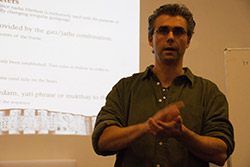 Born in Equatorial Guinea in 1961, Reina moved to Madrid at the age of seven. He graduated ‘Summa cum Laude’ in composition from Berklee College of Music in Boston, USA. Starting in 1993, he spent long periods in South India studying Karnatic music. These studies led to the creation of the programme ‘Contemporary Music Through Non-Western Techniques’ at the Conservatorium van Amsterdam. He has co-founded 2 ensembles (‘Interval Chamber Amsterdam’, and ‘Axyz Ensemble’), for which he wrote extensively. Reina’s extensive oeuvre of ensemble and orchestral pieces has been performed all over the world. In 2014 he completed a PhD at Brunel University called ’Karnatic rhythmical structures as a source for new thinking in Western music’.
Born in Equatorial Guinea in 1961, Reina moved to Madrid at the age of seven. He graduated ‘Summa cum Laude’ in composition from Berklee College of Music in Boston, USA. Starting in 1993, he spent long periods in South India studying Karnatic music. These studies led to the creation of the programme ‘Contemporary Music Through Non-Western Techniques’ at the Conservatorium van Amsterdam. He has co-founded 2 ensembles (‘Interval Chamber Amsterdam’, and ‘Axyz Ensemble’), for which he wrote extensively. Reina’s extensive oeuvre of ensemble and orchestral pieces has been performed all over the world. In 2014 he completed a PhD at Brunel University called ’Karnatic rhythmical structures as a source for new thinking in Western music’.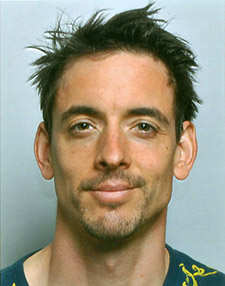 Born in 1977 in Klagenfurt/Austria, he studied Physical Education and Physics at the K.F. University in Graz. Since 2003, he teaches and does research at the institute for sport sciences of the K.F. University, and at school. His scientific focus is on the theory of sports training. As an experienced mountaineer and triathlete (Olympic distance and Ironman), he discovered that being different is a relevant factor to be successful in competitive situations. Besides his physical activities, Klaus Rom is an experienced saxophone and guitar player, father of three kids, husband, keeper of about 15 sheep and up to 10 chickens, and – guess what – never bored.
Born in 1977 in Klagenfurt/Austria, he studied Physical Education and Physics at the K.F. University in Graz. Since 2003, he teaches and does research at the institute for sport sciences of the K.F. University, and at school. His scientific focus is on the theory of sports training. As an experienced mountaineer and triathlete (Olympic distance and Ironman), he discovered that being different is a relevant factor to be successful in competitive situations. Besides his physical activities, Klaus Rom is an experienced saxophone and guitar player, father of three kids, husband, keeper of about 15 sheep and up to 10 chickens, and – guess what – never bored.-camille-blake-3.jpg) Wolfram Winkel is a classical percussionist whose primary focus is on contemporary music. As a guest musician of the Ensemble Modern, he performed regularly with Steve Reich at concert tours across Europe and Japan. He also played many solo parts with European radio orchestras (the Netherlands Radio Chamber Orchestra, RAI National Symphony Orchestra, Rundfunk-Sinfonierorchester Saarbrücken, Symphonieorchester des Bayerischen Rundfunks). At the University of Music and Performing Arts he has been teaching timpani and percussion since 2007. In 2008, he started offering method courses. Soon, he developed “rhythm studies,” both for performance majors and as an elective. In addition, since 2018, he teaches classes in chamber music.
Wolfram Winkel is a classical percussionist whose primary focus is on contemporary music. As a guest musician of the Ensemble Modern, he performed regularly with Steve Reich at concert tours across Europe and Japan. He also played many solo parts with European radio orchestras (the Netherlands Radio Chamber Orchestra, RAI National Symphony Orchestra, Rundfunk-Sinfonierorchester Saarbrücken, Symphonieorchester des Bayerischen Rundfunks). At the University of Music and Performing Arts he has been teaching timpani and percussion since 2007. In 2008, he started offering method courses. Soon, he developed “rhythm studies,” both for performance majors and as an elective. In addition, since 2018, he teaches classes in chamber music. Pianist Kathryn Woodard is an acclaimed interpreter of new music with numerous premieres to her credit including works by Ge Gan-ru with the Shanghai Quartet, Allen Otte, Huang Ruo, Paula Matthusen and many others. While completing her DMA degree at the University of Cincinnati College-Conservatory of Music, she trained as an instructor of Body Mapping with Barbara Conable. She regularly offers workshops for educators at music schools across the U.S. Woodard is a former student of HMTM where she studied with Gitti Pirner and Alexander Volkov.
Pianist Kathryn Woodard is an acclaimed interpreter of new music with numerous premieres to her credit including works by Ge Gan-ru with the Shanghai Quartet, Allen Otte, Huang Ruo, Paula Matthusen and many others. While completing her DMA degree at the University of Cincinnati College-Conservatory of Music, she trained as an instructor of Body Mapping with Barbara Conable. She regularly offers workshops for educators at music schools across the U.S. Woodard is a former student of HMTM where she studied with Gitti Pirner and Alexander Volkov.




